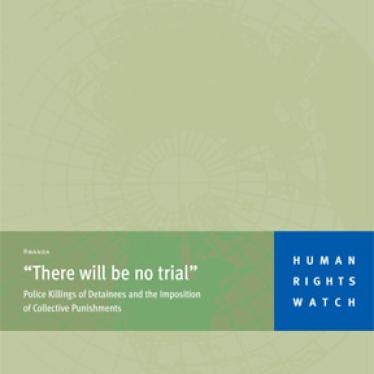(New York) - Deaths in police custody have increased in Rwanda, where officers of the National Police have killed at least 20 detainees since November, Human Rights Watch said in a report published today.
"Rwanda says it is striving to establish a state of law," said Alison Des Forges, senior adviser to Human Rights Watch’s Africa division. "Killing detainees is not the way to do it. The Rwandan National Police must ensure that the killings end."
The 37-page report, entitled "'There Will Be No Trial': Police Killings of Detainees and the Imposition of Collective Punishment," is based on dozens of interviews with families of victims, eyewitnesses and others. Human Rights Watch found that many of the 20 detainees killed were accused of crimes relating to genocide survivors or other persons involved in the gacaca process meant to deliver justice for the genocide. The others had been accused of murder, rape or theft.
Moreover, the report publishes a statement in which the police admit that 20 detainees were shot in custody. The statement, sent to Human Rights Watch by Andrew Rwigamba, Commissioner General of the Rwandan National Police, says that in every case the detainees were shot while attempting to escape or trying to disarm officers, presumably in attempts to escape. Human Rights Watch, however, gathered evidence that suggests in at least some cases this was patently untrue.
The police say that the deaths are being investigated. But they have not given further details of the investigations, who is carrying them out, or when they expect to complete them. They have also not given assurance that the results of the investigations will be made public.
After the announcement about new measures to protect survivors, police and local officials began imposing collective punishments – fines, required labor, and even beatings – on persons who lived near places where survivors had suffered property loss or damage. Those punished had not been tried and convicted of responsibility for the alleged crimes.
"The idea of innocent until proven guilty is fundamental to the legitimacy of a judicial system,” said Des Forges. “It is guaranteed by international law and the Rwandan constitution, and it must be implemented in Rwanda."







